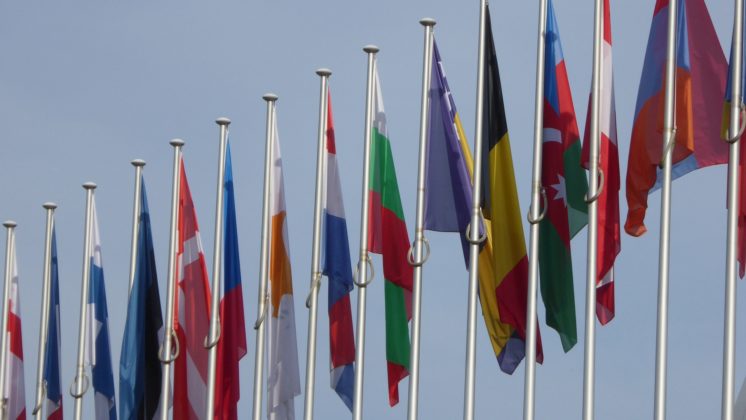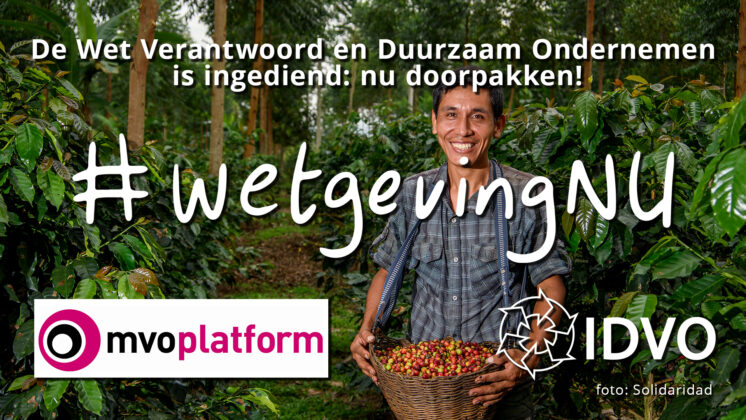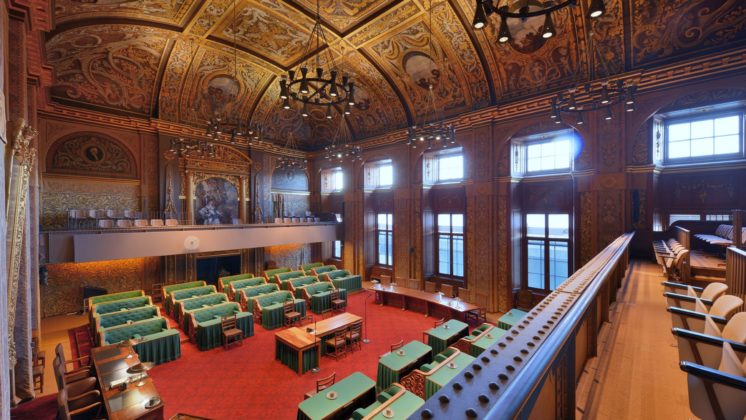On the 30th of May the MVO Platform hosted the event: ‘Due diligence-legislation in the Netherlands: a new era for responsible and sustainable business conduct’ at the Humanity Hub in the Hague. During the event, we reflected on a memorable moment: corporate responsibility is no longer voluntary for companies, it is turning into an obligation. The EU makes it mandatory for companies to avoid and address adverse impacts such as exploitation, land grabbing, and environmental damages.
 Photo: Twan Thio
Photo: Twan Thio
In a one-and-a-half-hour meeting, we looked back at how we got to this point and looked ahead at the implementation of the Corporate Sustainability Due Diligence Directive (CSDDD) in the Netherlands. The event featured participants from all walks of life: business, civil society organisations, trade unions, academics, civil servants, and regulators. With both people who were active in making human rights due diligence mandatory for many years, and people now, in the coming months and years, working with this law. David Ollivier de Leth (policy advisor at MVO Platform) was the moderator of the afternoon, which ended with festive drinks.

In conversation with…
Former Foreign Trade and Development Minister Tom de Bruijn provided the opening and introduction of the event. The former minister spoke about his time as minister and emphasised that back then the legislative dossier needed a lot of attention. He announced national legislation at that time. Tom de Bruijn stated that for him, looking at the final European law, the glass is half full. The law represents a very important first step.
Afterward, Manon Wolfkamp (formerly working for the MVO Platform) engaged in a conversation with Lara Wolters (PvdA Member of the European Parliament MEP) and Stieneke van der Graaf (former ChristenUnie Member of Parliament MP). They looked back at national and European developments and cautiously looked ahead to the implementation. Stieneke van der Graaf talked about the rollercoaster she went through around the submitted initiative bill. Together with five other political parties, she submitted this initiative bill on the 1st of November 2022. Lara Wolters talked about the demanding last months and the (sometimes 16-hour long) negotiations in the European Parliament and with the Council. She is happy with the outcome, but she too sees major flaws; such as the scope, the financial sector, and the value chain. Both speakers hope that with this law the lives of many people in value chains will improve and see plenty of opportunities alongside its shortcomings.

CSDDD implementation in the Netherlands
David Ollivier de Leth introduced and interviewed a panel about the implementation of the CSDDD in the Netherlands:
- Gilles Goedhart – Coordinator of RBC legislation, Ministry of Foreign Affairs
- Siri de Vrijer – Advisor public affairs, MVO Nederland (network of progressive businesses)
- Frans Dekker – Policy advisor Responsible Business Conduct, Dutch trade union FNV
- Ioan Nemes – Private sector lead, Oxfam Novib
- Liesbeth Enneking – Professor Corporate Responsibility and Sustainability at Erasmus School of Law in Rotterdam and NCP member.

From their perspective, the panel members answered questions such as:
- After all these negotiations, what outcome positively stands out?
- If you could address one shortcoming in the CSDDD with the implementation law, what would it be?
- What do you expect from the supervisory authority?
- What role do you see for civil society when the law will soon come into force?
- What does the implementation process look like over the next two years?
- What do companies need now to get off to a good start with the CSDDD?
The Ministry addressed the Netherlands’ recent commitment to the CSDDD and the process in the coming period. During implementation, stakeholders will be consulted and all standard steps will be followed. Gilles Goedhart emphasised that quite a few sustainability laws are coming at businesses at the moment and that it would be good if companies take the OECD guidelines as a starting point for all of these laws.

Like several other speakers, Liesbeth Enneking spoke about the smart mix of government measures needed and what is possible in the Dutch implementation law. Siri de Vrijer spoke about what companies need and what can help them in the transition to responsible and sustainable business.

Frans Dekker believes that regulators should remain at an appropriate distance from the companies in scope. “For FNV, the new law is a new stick to beat with in our trade union work, an important new weapon in our arsenal to stand up for working people.” Oxfam Novib’s Ioan Nemes is happy to see the CSDDD, but also expressed concerns. Excluding the financial sector, for example, stands out for Oxfam. “A change in mentality is needed in business. We do not want contracts where ‘liability’ is shifted to suppliers, but a real switch to own responsibility and thus not the shifting off responsibilities.”

The views of the Members of parliament
MPs Daniëlle Hirsch (GroenLinks-PvdA) and Marieke Koekkoek (Volt) ventured into a political preview of the Netherlands. Both politicians plan to follow the implementation closely. In a debate with Minister Schreinemacher two days earlier, the minister promised to send an update to the House of Representatives every three months, including about the organisation of supervision, something Hirsch considers very important.

Both politicians highlighted the tough period ahead. The development sector will be severely cut and this is bad news in a broad sense for sustainability, but also for the implementation and execution of the CSDDD. In terms of content, the two MPs see some major flaws in the law and would like to fix them, which also may be possible with additional measures.

Closing: brave people join forces
The afternoon was concluded by Gisela ten Kate (coordinator of the MVO Platform). She addressed the ‘new era’ in legislation, and what this means for the MVO Platform, which since its establishment 22 years ago has been convinced that there should be an obligation for companies. Among other things, the CSDDD makes the six steps of due diligence mandatory. And that is what the MVO Platform also had in mind. “We hope this law can make a real difference for people and the environment in value chains. At the same time, we are not there yet. There is still a lot to be done, both in terms of implementing and improving the law.”

In the past years a lot of different people worked incredibly hard on the legislation. The meeting was also meant as a tribute to all the people who have contributed to Due diligence- legislation. And somehow, all these efforts and people joined forces.
- There were brave public figures, many of whom also attended the event.
- There were ministry officials delivering high quality, with quiet but strong diplomacy.
- There were companies sticking their necks out and really wanting to see change, whether or not united in MVO Nederland or together with academics, civil society, trade unions, and religious bodies in the IDVO.
- And there were also the civil society organisations. In the end, every study, report, project, opinion, debate, video, and tweet contributed. And behind every action there was a whole team collaborating: here in the Netherlands, in numerous producing countries with which they worked together and across Europe – for example by gathering in the ECCJ.

Photographer: Twan Thio


